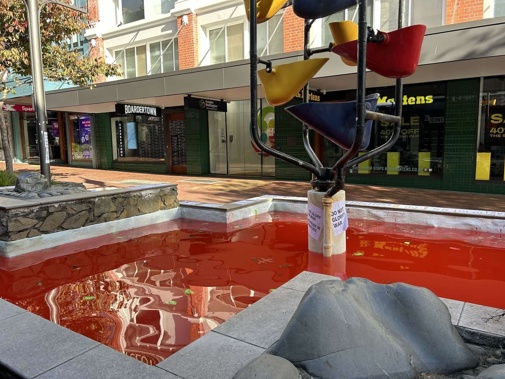
The Bucket Fountain on Wellington’s Cuba St has become the target of an Anzac Day anti-war protest.
The water has been dyed a deep red and posters have been stuck around its perimeter.
“Judaism is peace, Zionism is violence”, “No glory in war, No pride in genocide” and “Don’t glorify war” are some of the messages displayed on the posters.

Wellington's bucket fountain has been targeted by anti-war protesters on Anzac Day.
It comes as military veterans joined those still serving and the public at cenotaphs from the Far North to the deep south this Anzac Day.
Thousands gathered at dawn ceremonies around the country to commemorate Kiwis who have given their service - and for many, their lives - in military campaigns around the world.
A Wellington City Council spokesperson said while they recognise the “mesmerising allure of the fountain, we’d prefer it if people thought twice before vandalising it”.
“Our long-suffering staff will hopefully start a clean-up today – first they’ll have to check whether the dye is toxic or harmless before draining the water.”
Anzac Day protests are not uncommon in the Capital, with a major protest making headlines in 2017.
Peace activist Laura Drew was one of the people holding up an anti-war banner at the citizen’s wreath-laying ceremony in Wellington.
Drew told the Herald the group wanted to lay a white wreath to remember the six civilians killed in Afghanistan in 2010, allegedly by the New Zealand SAS.
Newshub was interviewing activists from Peace Action Wellington when the on-camera interview was interrupted by a NZ First representative and his 12-year-old son.
The son was quick to let the activists know he disapproved.
“Do it tomorrow, do it the day before, do it any day but today it is wrong, wrong, wrong,” the boy said.
In 2007, Valerie Morse was convicted of disorderly behaviour after her protest near the Cenotaph in Wellington when she burned a flag in protest against NZ’s involvement in the Afghan and Iraq wars.
The conviction was eventually quashed by the Supreme Court following Morse’s successful attempt to prove the protest was lawful under the Bill of Rights.
She said she had gone to court only to ensure no precedent was set.
”When young men and women go off to war, they go off under the flag of the nation. So when you burn the flag, you are sending a strong message.”
The first nation-wide Anzac Dawn Service in 1939 also featured protest action, with a group of people from the “Movement Against War and Fascism” handing out leaflets to attendees.
This story was originally published on the Herald, here
Take your Radio, Podcasts and Music with you









